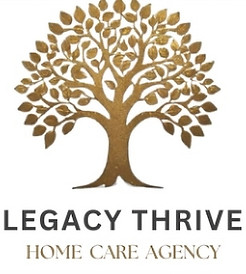8 Subtle Signs Your Elderly Loved One May Need At-Home Non-Medical Care
- mandydagold
- Jun 26
- 2 min read

As our parents or older relatives age, it’s natural for them to need a little more support. But how do you know when it’s time to consider in-home non-medical care?
At Legacy Thrive Home Care, we’ve seen that the need often shows up in small, subtle ways—things families may overlook until there's a crisis. Understanding these early signs can help you make compassionate, proactive decisions to keep your loved one safe and thriving at home.
1. Changes in Personal Hygiene
If your loved one begins to neglect bathing, grooming, or wearing clean clothes, this could be more than forgetfulness. It may indicate limited mobility, fear of falling, or early cognitive decline (CDC, 2020). Non-medical caregivers can assist with grooming in a respectful, dignified way.
2. Unexplained Weight Loss or Poor Nutrition
Are they skipping meals, losing weight, or eating only convenience foods? Malnutrition is a major concern for seniors, especially those who live alone. According to the Journal of Aging Research, many seniors don’t get adequate nutrition simply due to fatigue, memory loss, or difficulty cooking.
3. Difficulty Managing Medications
Missing doses or taking too much medication is common for older adults. While non-medical caregivers don’t administer meds, they can remind clients, help with pill organizers, and ensure routines are followed.
4. Increasing Falls or Mobility Concerns
Frequent stumbling, holding onto walls, or reluctance to walk may indicate a risk of falls. The National Institute on Aging reports that one in four older adults fall each year—many of which are preventable with proper assistance.
5. Isolation or Mood Changes
Loneliness and mood shifts can impact physical and mental health. Companion care provides regular social engagement, which can reduce anxiety and improve quality of life.
6. Neglected Household Tasks
Stacks of mail, dirty dishes, or expired food may signal that your loved one is overwhelmed or struggling to manage daily tasks.
7. Confusion or Memory Lapses
Repeating questions, getting lost, or struggling to follow directions may suggest cognitive changes. A structured care routine can reduce stress and improve focus.
8. Caregiver Stress in the Family
Sometimes the signs show up in you—the family caregiver. Burnout, frustration, or poor health means it's time to bring in outside support.
🏡 What Is Non-Medical Home Care?
Non-medical home care helps with:
Personal care (bathing, dressing)
Meal prep
Companionship
Light housekeeping
Transportation
Medication reminders
It does not include medical procedures, but it is essential for aging well at home.
💙 You Don’t Have to Wait for a Crisis
If you’ve noticed one or more of these signs, don’t feel guilty—feel empowered.
The earlier you act, the more likely your loved one can remain at home safely, with dignity and peace of mind.
📞 Call us today for a free in-home consultation 1-800-769-7492
🌐 www.legacythrivehomecare.com📍 Serving Wesley Chapel and surrounding areas

Comments